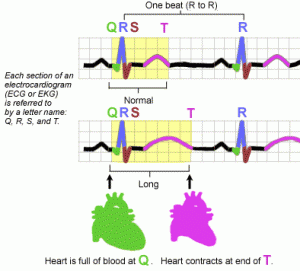What is QTc and Long QT syndrome (LQTS)?
Submitted by Dr T on September 28, 2010 – 2:10pm
My first question to you is, why do you want to know this? I assume your doctor told you. The question then is whether he told you this interval is prolonged ( I cannot tell from this number, although it looks OK) and next, whether he has said that you are at risk for what is called a “Long QT syndrome” (LQTS), which is a potentially dangerous arrhythmia that can result in sudden fainting spells or even seizures and sometimes “Sudden Cardiac Death”.
It is difficult to explain this problem without becoming too technical, but since you asked…
Findings
This is the definition:
QT intervals, corrected for heart rate (QTc) that are longer than 440 mseconds, are generally considered abnormal, though a normal QTc can be more prolonged in females (up to 460 msec). The formula used to calculate the QTc, as follows:
QTc = QT/square root of the R-R interval.
Causes
Many cases of LQTS are inherited, which means you’re born with the condition and have it your whole life. There are seven known types of
inherited LQTS. The most common ones are called LQTS 1, LQTS 2, and LQTS 3.
Emotional stress or exercise (especially swimming) that makes the heart beat fast tends to trigger abnormal heart rhythms if you have LQTS
1. In LQTS 2, abnormal rhythms may be triggered by surprise or other extreme emotions. In LQTS 3, a slow heart rate during sleep may trigger
an abnormal heart rhythm.
Acquired, or noninherited, LQTS may be brought on by certain medicines or other medical conditions
Symptoms
The most common symptoms include :
- Nothing. It is an incidental finding on EKG. Your doctor will probably want to know if this problem runs in the family (a rare genetic disorder), and next will check your medications, and do blood tests for low Potassium, Magnesium and Calcium. Patients with renal failure may also develop a LQTS as part of their kidney disease.
- Fainting. In some people with long QT syndrome, fainting spells are caused by an arrhythmia that results in your heart not pumping enough blood to your brain.
- Seizures. If this lasts a longer time, this may cause seizures.
- Sudden Cardiac Death (SCD). Often, the heart returns to its normal rhythm on its own. If this doesn’t happen, “Sudden Cardiac Death” may occur. Despite the name, there are patients who survive such episodes. It is for these type of problems you see those “defibrillators” in public buildings that are used to shock a heart back to a normal rhythm.
Complications
Usually, prolonged Q-T intervals is treated by correcting the underlying cause. However in some, physical or emotional stress may lead to a dangerous arrhythmia, including:
- Torsades de pointes.
If a torsades de pointes episode is short — lasting less than one minute — your heart can correct itself seconds later, and you regain consciousness on your own. However, if it persists, it may lead to a life-threatening arrhythmia called ventricular fibrillation.
- Ventricular fibrillation and Sudden Cardiac Death. When this happens, your heart ceases pumping blood. Unless your heart is shocked back into a normal rhythm a defibrillator, it may lead to brain damage and death.
Treatment
Patients with long QT syndrome (LQTS) should avoid drugs that prolong the QT interval or reduce their serum potassium or magnesium levels. Potassium and magnesium deficiency should be corrected.
- Beta-blockers are drugs of choice for patients with LQTS
- The implantable cardioverter-defibrillator (ICD) has been shown to prevent sudden cardiac death (SCD) in high-risk patients.
Hope this helps,



